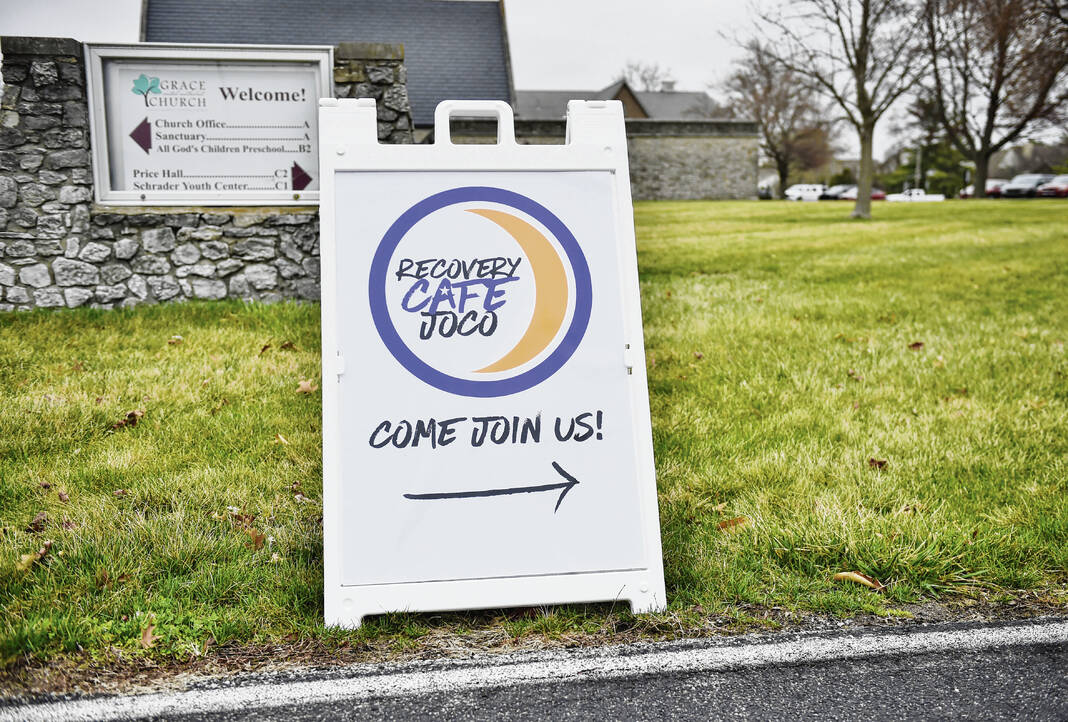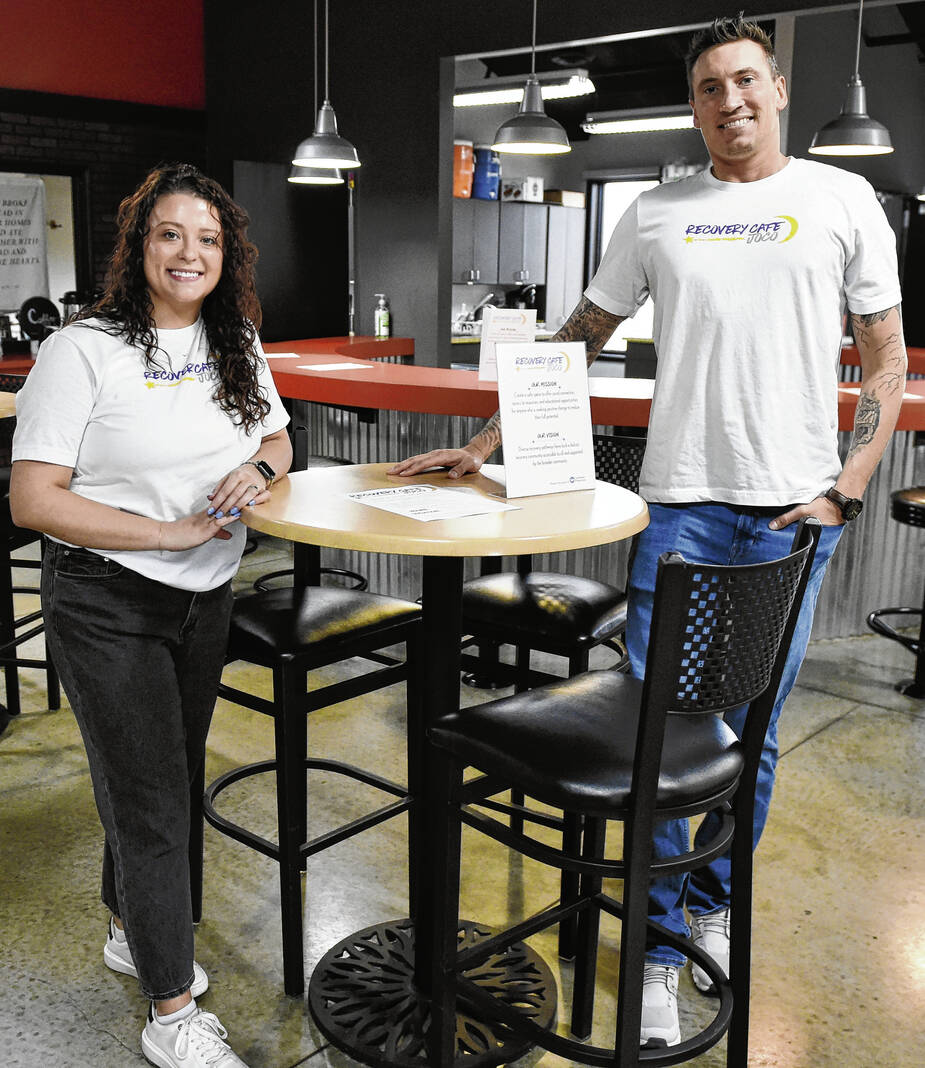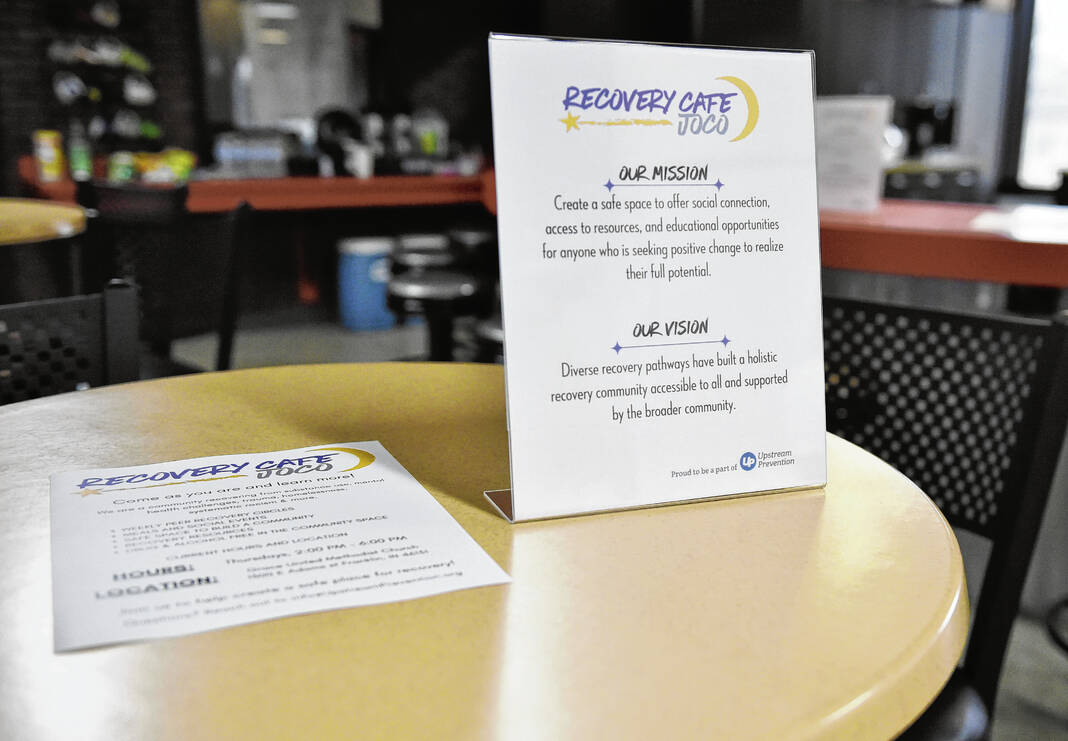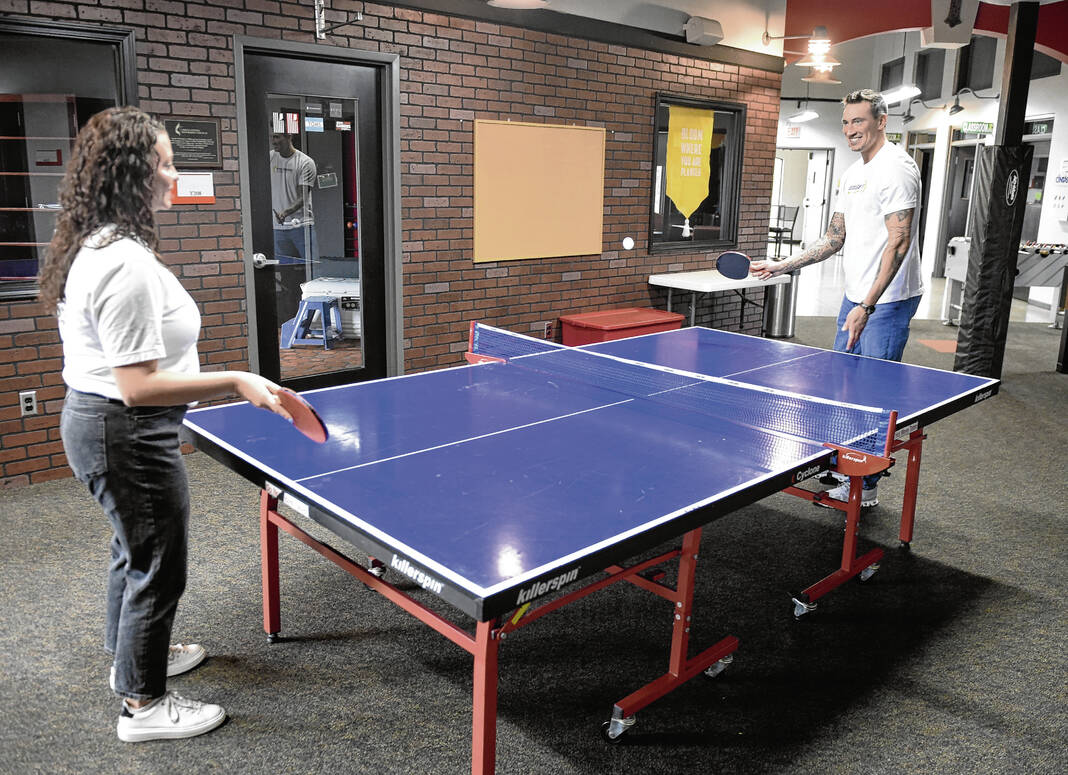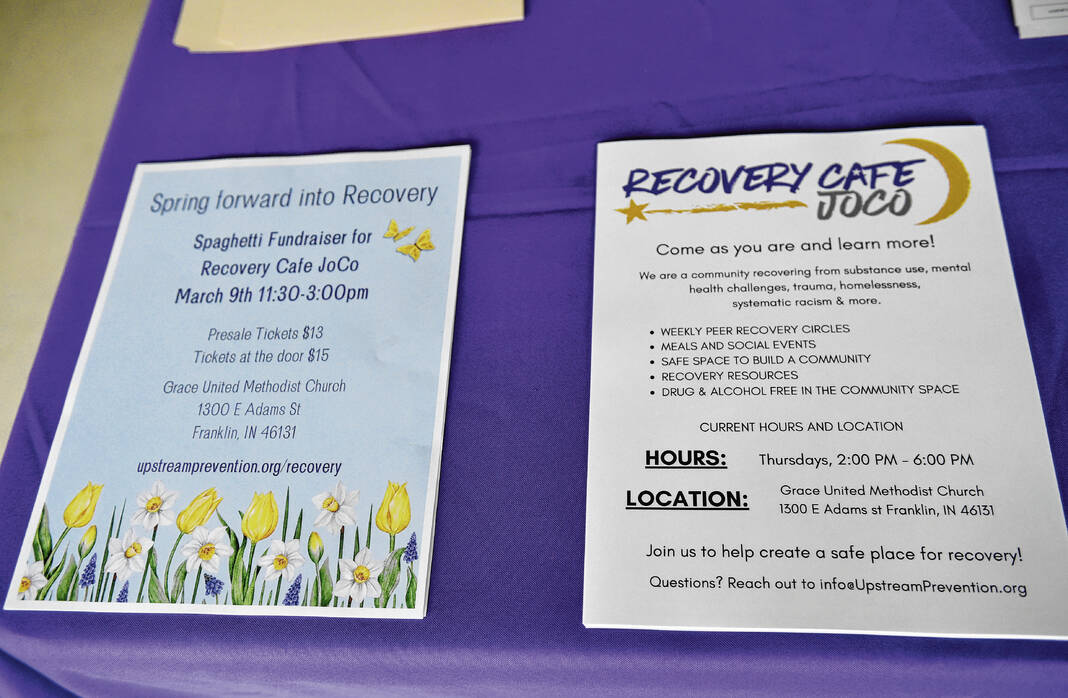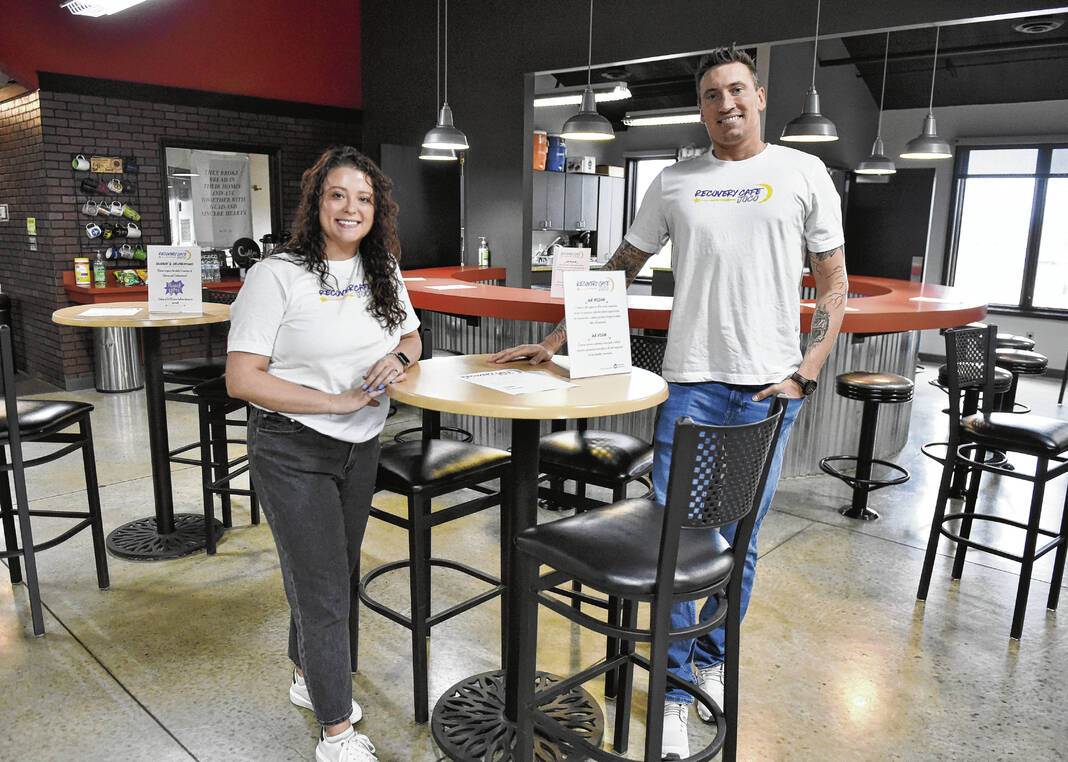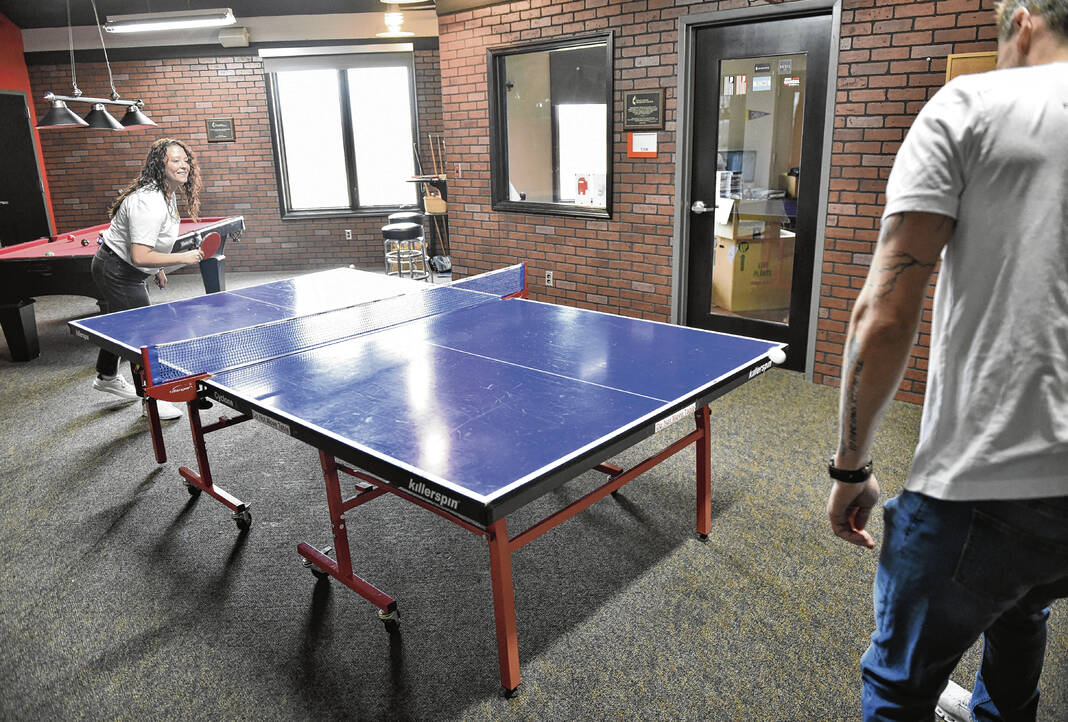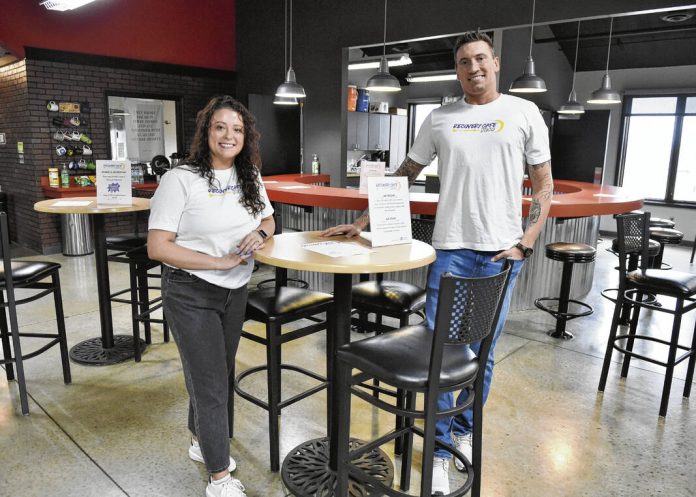
Jaycie Miller, left, public health educator for the Johnson County Health Department, and Kaleb Lane, peer recovery coach for Upstream Prevention, at the initial launch of Recovery Cafe JoCo at Grace United Methodist Church on Thursday. The cafe, intended as a space for people to support each other in recovery, will be open every Thursday at the church.
RYAN TRARES | DAILY JOURNAL
Much of Johnson County’s public health community, and those who are involved in recovery efforts locally, have dreamed of a place to find and give support regularly.
They envisioned a place where people could talk with others going through recovery for addiction or other behavioral health issues, to spend some time in a healing place free of drugs or alcohol.
This week, that space became a reality.
Johnson County’s first recovery cafe welcomed its first visitors this week — albeit in a temporary home. People gathered in the Schrader Youth Center at Grace United Methodist Church, where they sipped coffee, played ping-pong and pool, and shared dinner.
The weekly meetings of Recovery Cafe JoCo will be held at Grace while organizers search for a permanent home for the spot. Fundraising efforts are ongoing, including a spaghetti lunch planned for Saturday.
Still, just to have the recovery cafe effort started has been a relief for those pushing for it.
“To essentially go from October when we first verbalized that this is coming sometime soon-ish, to have a soft-opening potential in March is very exciting,” said Kathleen Ratcliff, executive director for Upstream Prevention. “I don’t think anyone would have thought it would happen this fast, but it’s overdue and very much needed.”
Organizers announced the pursuit of a recovery cafe in Johnson County in late 2023. Upstream Prevention, an organization that aims to support positive mental health, decrease suicides and address substance abuse in Johnson County, partnered with the Johnson County Health Department and others in efforts to bring the concept to fruition.
About 20 recovery cafes have been established around Indiana, in communities such as Indianapolis, Fishers and Greenfield.
The idea is to create a community space that is drug- and alcohol-free, embracing, and healing, according to the Recovery Cafe Network, a national group of recovery cafes committed to serving people who have experienced trauma and the results of trauma like homelessness, substance use disorder, addiction, and other mental health challenges, according to the Recovery Cafe Network.
“Traditionally, a person receives support when they are in crisis and finds that the support is removed once they begin to experience stability. That model of emergency intervention and abandonment sets one up for a roller-coaster existence which is not only cruel, in that it locks one into a cycle of intense suffering and failure, it is expensive, ineffective, and a waste of human potential,” according to the Recovery Cafe Network’s website.
The recovery cafe model instead offers support, resources, and a community of care along the entire continuum of a person’s need for recovery support. People are taught skills to manage mental and physical health, maintain sobriety, build community, and help individuals reclaim their lives and identities as persons worthy of giving and receiving love.
“It’s a safe place for recovery to happen. It welcomes all pathways; one of the pillars is radical love — loving people until they can learn to love themselves,” said Kaleb Lane, peer recovery coach for Upstream Prevention, during an interview in December.
Since announcing plans to start Recovery Cafe JoCo, the focus has been on fundraising and hoping to find a suitable location.
But while those efforts are ongoing, organizers wanted to at least start meeting in a temporary way.
“We’re doing kind of a soft-launch, opening one day a week in a temporary location,” Ratcliff said. “We’ll still have that hot meal or food aspect, coffee, and then that space to just gather and be.”
For the time being, the recovery cafe will be open from 2 to 6 p.m. every Thursday. Despite being called a “cafe,” the space will not be a coffee shop or eatery. While there will be coffee and snacks inside, it’s more meant to be a community gathering area, Ratcliff said.
Eventually, the recovery cafe will have low-level membership requirements — basically attending circle meetings, giving back to the community and remaining substance-free while being present in the space, Ratcliff said. Memberships are free, though.
“For those first couple of weeks, it’s going to be more about gathering, having an opportunity to build community. As we gather members, then we can start offering some of those member perks and educational opportunity type things,” she said.
People are invited to come to Grace United Methodist Church on Thursdays to see the recovery cafe in action for themselves, Ratcliff said.
“People can just show up,” she said. “Right now, when we’re still at one day a week, we really want people to come check us out and see if it’s something they like.”
HOW TO HELP
Johnson County Recovery Cafe
What: A community space that is drug- and alcohol-free, embracing and healing, offering support, resources and a community of care along the entire continuum of a person’s need for recovery support.
Where: Grace United Methodist Church, 1300 E. Adams St., Franklin, temporarily
When: 2-6 p.m. Thursdays
Support: To make the recovery cafe project a reality, organizers are raising money through the Upstream Prevention website. People can go to upstreamprevention.org/upstream-initiatives/recovery to donate.
Spring Forward into Recovery Spaghetti Fundraiser: 11:30 a.m.-3 p.m. Saturday, Grace United Methodist Church; lunch includes salad, spaghetti with marinara sauce (optional meatballs), breadstick, dessert and a water. Tickets $15, gluten-free spaghetti $17.
Information: Tickets and information can be found at facebook.com/rcjoco or upstreamprevention.org/recovery


